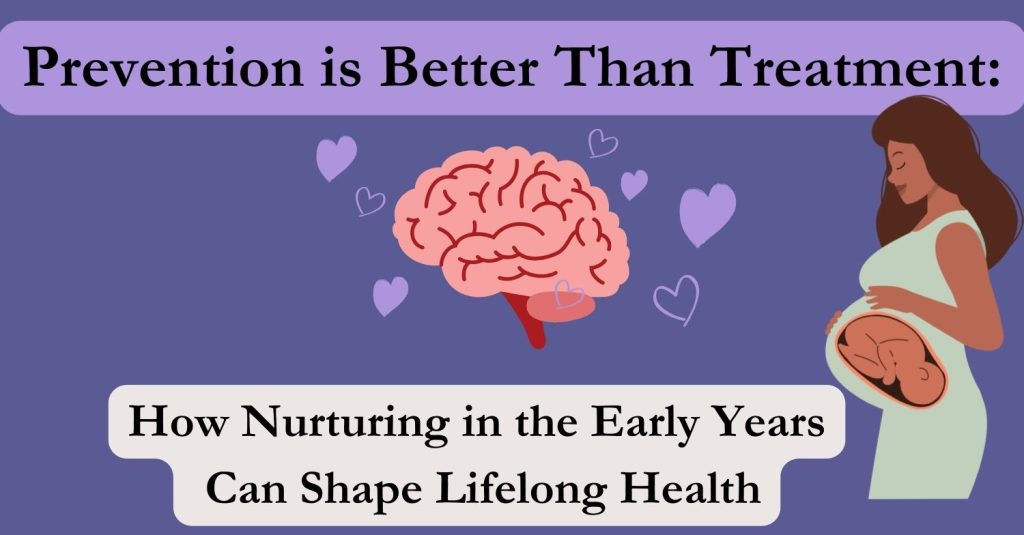By Joanne Fisher, BodyTalk Birthkeeper
“What if we had a way to gift our babies and the next generation with resilient brain systems to reduce the risk of anxiety, depression, addiction, chronic stress, and poor physical health? A gift that goes above and beyond that to provide lifelong thriving, connection, peace, confidence, joy, awe, and empathy.”
– Dr. Greer Kirshenbaum
As caregivers, we have an incredible opportunity to positively influence the health and development of our babies’ brains, starting from the womb. Brain growth is most rapid in the first three years of life, with 85% of its development happening in this crucial period. The experiences an infant has during this time literally shape their brain. Neurons that fire together, wire together, which means the repeated experiences a baby has determine the way their brain connections form. If those early experiences are stressful or unresponsive to their needs, their brain becomes wired for dysfunction.
My work with babies begins even earlier than birth—while they are still in the womb. This pre-birth nurturing sets the foundation for the infant’s healthy brain development, going beyond what can be done once the baby is born. By addressing the earliest stages of life, we can prevent many of the issues that arise from stress and trauma later on.
This work is highly influenced by my mentor, Dr. Greer Kirshenbaum, a neuroscientist, doula, and mother, who is pioneering a new approach to caring for babies, both day and night. She’s leading what she calls the Nurture Revolution, an effort to reshape how we care for infants. By nurturing babies from the start, we can build resilient brains that are wired for thriving, not just surviving.
The Last Hundred Years: Where We Went Wrong
In the last hundred years, modern society has made the grave mistake of disregarding the first three years of a baby’s life. New parents are often left with little to no support, pushed to train their babies to be independent too early, forcing them to sleep alone, cry without comfort, and prematurely suppress emotions. This outdated approach ignores the essential needs of babies, and, as Dr. Kirshenbaum explains, it wires their brain in ways that make them more vulnerable to lifelong struggles with anxiety, depression, addiction, and chronic stress.
This lack of nurturing also impacts their physical health. When we interfere with babies’ sleep or withhold emotional support, it can shape their body towards lifelong vulnerabilities to illness and chronic disease.
The mental health crisis we see today can be traced back to these early missteps. By failing to nurture babies in their most formative years, we’ve created generations with brains wired for struggle. But we can turn this around. The future doesn’t have to follow the same path if we embrace what neuroscience tells us and provide the care our babies need.
How Can We Make a Difference?
Did you know that infancy lasts until age 3? During these early years, babies and toddlers need continual, loving support from attuned, regulated caregivers. I can speak from my own experience. When my first child was little, I found myself triggered by his big emotions and unable to hold space for him. It wasn’t until I addressed my own unresolved childhood experiences that I could truly be present and support him through his emotional outbursts.
Most of us didn’t receive the deep nurturing and responsive care we needed growing up. But here’s the thing: our children show us what needs healing by triggering us. In this way, they help us find the missing pieces within ourselves that we need to work on. This is the essence of conscious parenting—healing our own wounds so that we can give our children what they truly need.
From Womb to Three Years: A Lifelong Impact
The work I do with babies doesn’t just start at birth—it starts in the womb, ideally even from conception. I have had the incredible privilege of working with one little boy from the time he was in the womb, through his birth, and every month of his life until he recently turned three. Watching him thrive has been such a gift, and I am so excited to see the kind of person he grows into.
These babies—deeply nurtured and supported from the start—have the potential to change the world. They are the antidote to the “hurt people, hurt people” cycle. I truly believe that the healthy, happy babies I work with will go on to heal the world, creating ripple effects that will last for generations.
In future blog posts, I will dive deeper into Adverse Babyhood Experiences (ABEs) and their impact on long-term physical health, but for now, let’s focus on the good news: we have the power to make a difference. The Nurture Revolution is happening now, and by supporting our babies’ brain development from the earliest moments of life, we can lay the foundation for a healthier, more connected world.
So, will you join me in the Nurture Revolution? Together, we can help babies thrive and build a better future for all.

